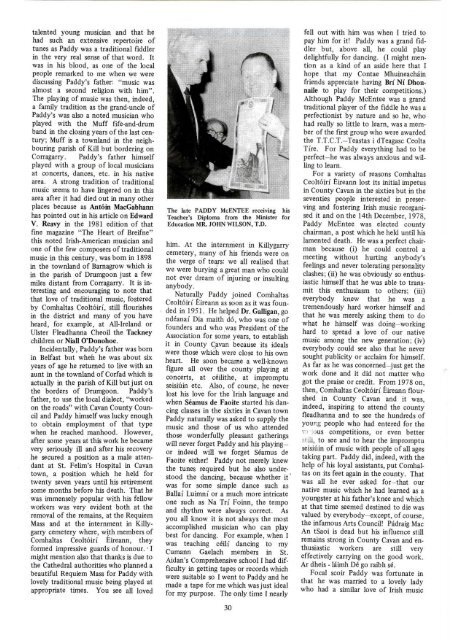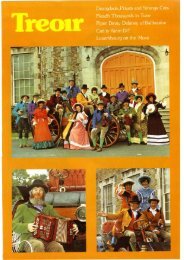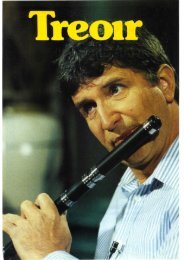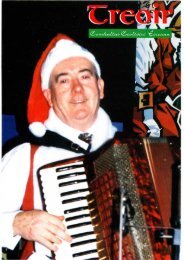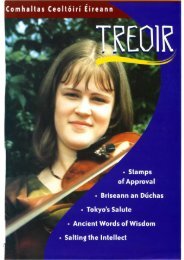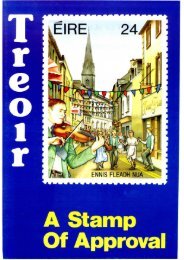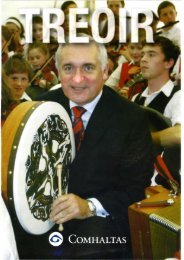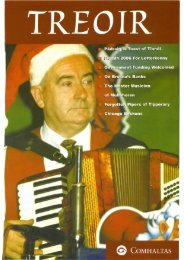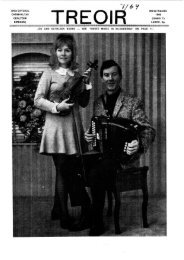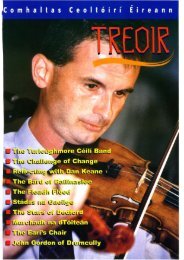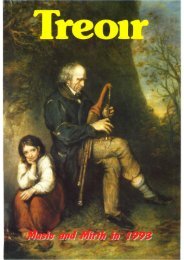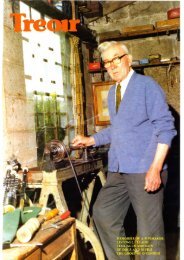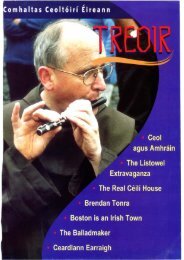sligo for all-ireland? - Comhaltas Archive
sligo for all-ireland? - Comhaltas Archive
sligo for all-ireland? - Comhaltas Archive
- No tags were found...
Create successful ePaper yourself
Turn your PDF publications into a flip-book with our unique Google optimized e-Paper software.
talented young mUSICIan and that hehad such an extensive repertoire oftunes as Paddy was a traditional fiddlerin the very real sense of that word. Itwas in his blood, as one of the localpeople remarked to me when we werediscussing Paddy's father: "music wasalmost a second religion with him".The playing of music was then, indeed,a 'family tradition as the grand-uncle ofPaddy's was also a noted musician whoplayed with the Muff fife-and-drumband in the closing years of the last century;Muff is a townland in the neighbouringparish of Kill but bordering onCorragarry. Paddy's father himselfplayed with a group of local musiciansat concerts, dances, etc. in his nativearea. A strong tradition of traditionalmusic seems to have lingered on in thisarea after it had died out in many otherplaces because as Ant6in MacGabhannhas pointed out in his article on Edward .V. Reavy in the 1981 edition of thatfme magazine "The Heart of Breifne"this noted Irish-American musician andone of the few composers of traditionalmusic in this century, was born in 1898in the townland of Barnagrow which isin the parish of Drumgoon just a. f~wmiles distant from Corragarry. It IS mteresting and encouraging to note thatthat love of traditional music, fosteredby <strong>Comhaltas</strong> Ceolt6iri, still flourishesin the district and many of you haveheard , <strong>for</strong> example, at All-Ireland orUlster Fleadhanna Cheoil the Tackneychildren or Ni<strong>all</strong> O'Donohoe.Incident<strong>all</strong>y, Paddy's father was bo~in Belfast but when he was about SIXyears of age he returned to live with anaunt in the townland of Corfad which isactu<strong>all</strong>y in the parish of Kill but just onthe borders of Drumgoon. Paddy'sfather, to use the local dialect, "workedon the roads" with Cavan County Counciland Paddy himself was lucky enoughto obtain employment of that typewhen he reached manhood. However,after some years at "this work he becamevery seriously ill and after his recoveryhe secured a position as a male attendantat St. Felim's Hospital in Cavantown, a position which he held <strong>for</strong>twenty seven years until his retirementsome months be<strong>for</strong>e his death. That hewas immensely popular with his fellowworkers was very evident both at the. removal of the remains, at the RequiemMass and at the internment in Killygarrycemetery where, w~th members of<strong>Comhaltas</strong> Ceolt6iri Eireann, they<strong>for</strong>med impressive guards of honour. . Imight mention also that thanks is due tothe Cathedral authorities who planned abeautiful Requiem Mass <strong>for</strong> Paddy withlovely traditional music being played atappropriate times. You see <strong>all</strong> lovedThe late PADDY McENTEE receiving hisTeacher's Diploma from the Minister <strong>for</strong>Education MR. JOHN WILSON, T.D.him. At the internment in Killygarrycemetery, many of his friends were onthe verge cif tears: we <strong>all</strong> realised thatwe were burying a great man who couldnot ever dream of injuring or insultinganybody.Natur<strong>all</strong>y Paddy joined <strong>Comhaltas</strong>Ceolt6iri Eireann as soon as it was foundedin 1951. He helped Dr. G<strong>all</strong>igan, gondeanai Dia maith d6 , who was one offounders and who was President of theAssociation <strong>for</strong> some. years, to establishit in County C,avan because its idealswere those which were close to his ownheart. He soon became a well-knownfigure <strong>all</strong> over the county playing atconcerts, at ceilithe, at impromptuseisiuin etc. Also , of course, he neverlost his love <strong>for</strong> the 'Irish language andwhen Seamus de Faoite started his dancingclasses in the sixties in Cavan townPaddy natur<strong>all</strong>y was asked to supply themusic and those of us who attendedthose wonderfully pleasant gatheringswill never <strong>for</strong>get Paddy and his playingorindeed will ' we <strong>for</strong>get Seamus deFaoite either! Paddy not merely knewthe tunes required but he also under- ,stood the dancing, because whether itwas <strong>for</strong> some simple dance such asB<strong>all</strong>ai Luimni or a much more intricateone such as Na Tri Foinn, the tempoand rhythm were always correct. Asyou <strong>all</strong> know it is not always the mostaccomplished musician who can playbest <strong>for</strong> dancing. For example, when Iwas teaching ceili dancing to myCumann Gaelach members in St.Aidan's Comprehensive school I had difficultyin getting tapes or records whichwere suitable so I went to Paddy and hemade a tape <strong>for</strong> me which was just ideal<strong>for</strong> my purpose. The only time I nearly30fell out with him was when I tried topay him <strong>for</strong> it! Paddy was a grand fiddlerbut, above <strong>all</strong>, he could playdelightfully <strong>for</strong> dancing. (I might mentionas a kind of an aside here that Ihope that my Contae Mhuineachainfriends appreciate having Bri Ni Dhonnaileto play <strong>for</strong> their competitions.)Although Paddy McEntee was a grandtraditional player of the fiddle he was aperfectionist by nature and so he, whohad re<strong>all</strong>y so little to learn, was a memberof the first group who were awardedthe T.T.C.T.- Teastas i dTeagasc CeoltaTire. For Paddy everything had to beperfect- he was always anxious and willingto learn.For a variety of reasons <strong>Comhaltas</strong>Ceolt6iri Eireann lost its initial impetusin County Cavan in the sixties but in theseventies people interested in preservingand fostering Irish music reorganisedit and on the 14th December, 1978,Paddy McEntee was elected countychairman, a post which he held until hislamented death. He was a perfect chairmanbecause (i) he could control ameeting without hurting anybody'sfeelings and never tolerating personalityclashes ; (ii) he was obviously so enthusiastichimself that he was able to transmitthis enthusiasm to others; (iii)everybody knew that he was atremendously hard worker himself andthat he was merely asking them to dowhat he himself was doing- workinghard to spread a love of our nativemusic among the new generation; (iv)everybody could see also that he neversought publicity or acclaim <strong>for</strong> himself.As far as he was concerned- just get thework done and it did not matter whogot the praise or credit. F~om 1978 on,then, <strong>Comhaltas</strong> Ceolt6iri Eireann flourshedin County Cavan and it was,indeed, inspiring to attend the countyfleadhanna and to see the hundreds ofyoung people who had entered <strong>for</strong> the.;] ~o us competitions, or even betterstill, to see and to hear the impromptuseisiuin of music with people of <strong>all</strong> agestaking part. Paddy did, indeed, with thehelp of his loyal assistants, put <strong>Comhaltas</strong>on its feet again in the county. Thatwas <strong>all</strong> he ever asked <strong>for</strong>- that ournative music which he had learned as ayoungster at his father's knee and whichat that time seemed destined to die wasvalued by everybody- except, of course,the infamous Arts Council! Padraig MacAn tSaoi is dead but his influence stillremains strong in County Cavan and enthusiasticworkers are still veryeffectively carrying on the good work.Ar dheis - laimh De go raibh se.Focal scoir Paddy was <strong>for</strong>tunate inthat he was married to a lovely ladywho had a similar love of Irish music


